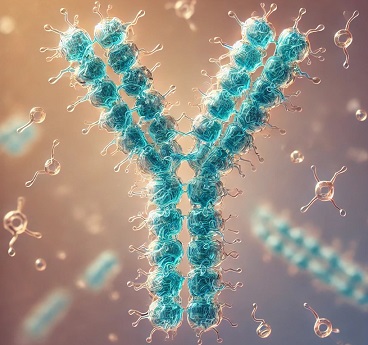Nikhil Prasad Fact checked by:Thailand Medical News Team Jul 01, 2024 1 year, 6 months, 3 weeks, 5 days, 20 hours, 28 minutes ago
Immunology Updates: Inflammation is the body's natural response to injury or infection, but sometimes it goes overboard, causing more harm than good. Scientists have been searching for ways to control this excessive inflammation, especially in severe cases like Macrophage Activation Syndrome (MAS) and COVID-19. Recently, a new study by researchers from University of Colorado Denver-USA, Research Center Borstel-Leibniz Lung Center, Borstel-Germany, Airway Research Center North-Germany, MAB Discovery GmbH-Germany, Aarhus University Hospital-Denmark, Children’s Hospital Colorado-USA and IcanoMAB GmbH-Germany that is covered in this
Immunology Updates report, has shown that an antibody targeting a specific receptor can significantly reduce inflammation in mice.
 Antibody Targeting IL-1 Receptor 7 Protects from LPS-Induced Inflammation
Image: AI Generated
What is IL-18 and why is it Important?
Antibody Targeting IL-1 Receptor 7 Protects from LPS-Induced Inflammation
Image: AI Generated
What is IL-18 and why is it Important?
Interleukin-18 (IL-18) is a protein in the body that plays a crucial role in the immune system. It's part of a group of proteins called cytokines, which help regulate inflammation. When there's an infection or injury, IL-18 levels rise to help fight off the problem. However, in some diseases, IL-18 levels become too high, leading to severe inflammation and tissue damage.
The Role of IL-1 Receptor 7 (IL-1R7)
IL-18 works by binding to its receptors, IL-1 Receptor 5 (IL-1R5) and IL-1 Receptor 7 (IL-1R7). When IL-18 binds to these receptors, it sets off a chain reaction that leads to inflammation. Scientists have found that by blocking IL-1R7, they can stop IL-18 from causing excessive inflammation. This discovery has led to the development of a new antibody that targets IL-1R7.
How the Antibody Works
Researchers developed a monoclonal antibody that specifically targets IL-1R7. Monoclonal antibodies are lab-made molecules that can bind to specific proteins in the body. In this case, the antibody binds to IL-1R7, blocking IL-18 from activating the receptor. This prevents the inflammatory chain reaction from starting.
Testing the Antibody in Mice
To test the effectiveness of this new antibody, scientists conducted experiments on mice. They used a model where mice were exposed to a bacterial component called lipopolysaccharide (LPS) to induce inflammation, similar to what happens in severe infections or autoimmune diseases. The results were promising:
-Reduced Inflammation: Mice treated with the antibody showed significantly lower levels of inflammation. This was evident from the reduced levels of inflammatory proteins like IFNg, TNFa, IL-1b, and IL-6 in their blood.
-Less Tissue Damage: The antibody also protected the mice from tissue damage. For example, mice that received the antibody had less liver da
mage when exposed to the inflammation-inducing agents compared to untreated mice.
-Protection from Lung Injury: In another experiment, the antibody reduced inflammation and tissue damage in the lungs of mice exposed to LPS, which mimics conditions like acute lung injury (ALI) seen in severe respiratory infections.
Potential Implications for Human Health
These findings are exciting because they suggest that this antibody could potentially be used to treat severe inflammatory conditions in humans. Diseases like MAS, severe COVID-19, and other inflammatory diseases could benefit from this targeted approach. However, it's important to note that these results are from animal studies. More research is needed to determine if the antibody will work similarly in humans.
Future Steps
The next steps for this research include:
-Clinical Trials: Before the antibody can be used in humans, it needs to go through clinical trials to ensure it's safe and effective. These trials will involve multiple phases, starting with small groups of healthy volunteers and eventually moving to larger groups of patients with inflammatory diseases.
-Understanding Mechanisms: Researchers also need to understand more about how the antibody works at a molecular level. This will help optimize the treatment and possibly develop similar therapies for other inflammatory conditions.
-Exploring Combinations: There is potential for combining this antibody with other treatments to enhance its effectiveness. For example, combining it with existing anti-inflammatory drugs could provide even better results.
Conclusion
The discovery of this new antibody targeting IL-1R7 is a significant step forward in the fight against severe inflammation. While more research is needed, the initial results are promising and offer hope for better treatments for conditions like MAS, severe COVID-19, and other inflammatory diseases. By controlling the body's inflammatory response more precisely, we can improve outcomes for patients suffering from these challenging conditions.
The study findings were published in the peer reviewed journal: Frontiers in Immunology.
https://www.frontiersin.org/journals/immunology/articles/10.3389/fimmu.2024.1427100/full
For the latest
Immunology Updates, keep on logging to Thailand Medical News.
Read Also:
https://www.thailandmedical.news/news/serpinb9-a-new-frontier-in-immunotherapy
https://www.thailandmedical.news/news/tregitopes-a-revolutionary-approach-to-treating-immune-disorders
